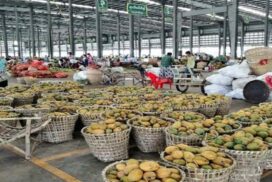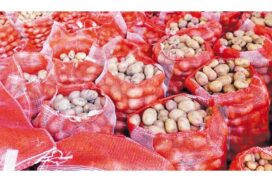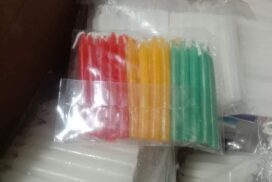By TWA / Translated by CT
Traders are closely monitoring the Yangon beans and pulses market, as the prices fluctuate almost daily for these exported goods.
Currently, buyers request dealers to present sample packs of beans and pulses for evaluation, unlike the practice before 2010 when they were openly displayed. After the commodity depot’s closing hours, some traders engage in price negotiations over the phone during the evening and night.
In the morning, the lower hall of the Bayintnaung Commodity Depot is bustling with the sale of commodities like onions and potatoes. During this time, onion, jaggery, and chilli pepper traders set their opening prices at certain streets and brokerage house meeting points. Potato traders set their opening prices around 10 am, while bean traders open their markets at noon, and edible oil traders start trading at 1 pm.
The commodity prices for the day are available both online and in paper form, published by the commodity depot after compiling the price list for Yangon and the export FOB price sheet. However, the prices of rice and palm oil are not mentioned in the daily price list of the Bayintnaung Commodity Depot as they belong to specific non-governmental organizations (NGOs).
Before 7 am, some brokerage houses register the daily supply of onions and potatoes, noting the number of truckloads and the origin regions. They use this information to set their opening prices at the rallying place in front of the brokerage house on Yaytama Road. Regional traders, especially those from Nyaungpinlay Market in Lanmadaw Township, closely monitor these opening prices for fluctuations.
For those who cannot visit the Bayintnaung Market in person, the daily prices can be observed through social media posts around 7 am. Some regional traders may pay more than the official opening price to buy rare goods. When demand is low at the market’s opening, the brokerage houses may sell at an adjusted price below the opening price.
In the market, both sellers and buyers must establish mutual trust, not only regarding the goods but also the prices. Buyers often prefer to purchase goods on credit rather than make immediate payments. Although the commodity depot sets the credit period for goods to be not more than two weeks, the actual credit period is often longer, depending on agreements between the seller and the buyer. To access the commodity trading area, a recognized membership card is required. The Bayintnaung Commodity Depot, being the largest trading centre in Yangon, holds great importance for traders.
The brokerage houses in the Bayintnaung Commodity Depot were relocated from Lanmadaw and Latha Townships. The depot was established around 1993, making both the depot and brokerage houses nearly 30 years old.














